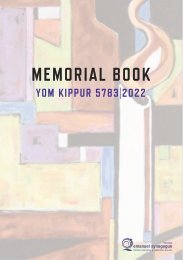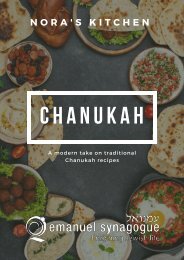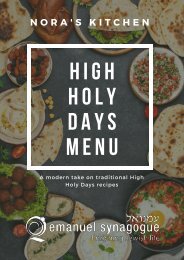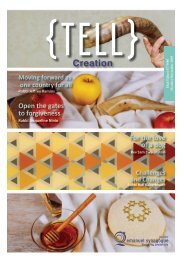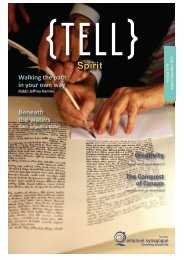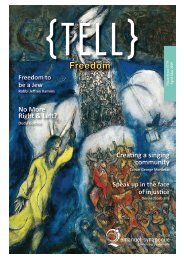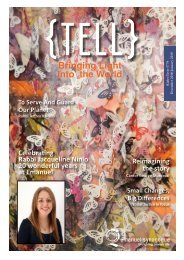TELL Magazine: October - November 2019
The magazine of Emanuel Synagogue, Sydney Australia
The magazine of Emanuel Synagogue, Sydney Australia
Create successful ePaper yourself
Turn your PDF publications into a flip-book with our unique Google optimized e-Paper software.
{HOME IS A STATE OF BEING}<br />
Donna Jacobs Sife<br />
Several years ago, between Yom Kippur and Sukkot, I traveled across<br />
New South Wales to Broken Hill, following the Darling River<br />
and camping beneath the moon. I learnt a little about the land,<br />
the history and the simple pleasures of being a wanderer.<br />
I learnt about Black Country and Red<br />
Desert. I marveled at the big skies,<br />
walked through strangely fragrant<br />
wildflowers, across cracked and thirsty<br />
earth, and mourned a plundered<br />
river. I heard of the sacrifice made<br />
by desperate men who made Australia<br />
prosper; how without the mines<br />
they would have starved and yet<br />
within them endured great sufferings<br />
and early death. I viewed remote<br />
caves with ancient aboriginal art,<br />
mysterious markings in code. I met<br />
black cockatoos, eye to eye, bright<br />
green parrots, emu tracks, and eagles<br />
doing their best to clear the gory<br />
animal remains of road carnage. A<br />
little history, a glimpse of country,<br />
a broadening of my sense of home.<br />
Whilst contemplating the endless<br />
red road, that disappeared into<br />
what seemed to be a distant<br />
island, shimmering in the heat, I<br />
remembered the opening words<br />
of the Seder night on passover<br />
- “My ancestor was a wandering<br />
Aramean”. Why are we reminded<br />
of this, year after year?<br />
We come from a tradition of nomadic<br />
life. The word itself comes from the<br />
word ‘pasture’. Abraham, Jacob,<br />
David – they all tended their flocks,<br />
traveling here and there to find the<br />
greenest pastures. Perhaps the first<br />
keeper of sheep was Abel. Cain was a<br />
settled farmer. Abel was the favourite<br />
of God, and yet Cain, who would<br />
build the first city, was promised<br />
dominion over him. A Midrashic<br />
verse, commenting on their quarrel,<br />
says that the sons of Adam inherited<br />
an equal division of the world: Cain<br />
the ownership of all land, Abel of<br />
all living creatures – whereupon<br />
Cain accused Abel of trespass.<br />
The names of the brothers are a<br />
matched pair of opposites. Abel<br />
comes from the Hebrew ‘hebel’,<br />
meaning ‘breath’ or ‘vapour’: anything<br />
that lives and moves and is transient.<br />
The root of Cain appears to be the<br />
verb ‘kanah’: to ‘acquire’, ‘get’, ‘own<br />
property’ and so ‘rule’ or ‘subjugate.’<br />
The prophets Isaiah, Jeremiah, Amos<br />
and Hosea were nomadic revivalists<br />
who howled abuse at the decadence<br />
of civilization. By sinking roots in<br />
the land, by ‘laying house to house<br />
and field to field’, by turning the<br />
Temple into a sculpture garden,<br />
we had turned away from God.<br />
As wanderers, we owned only what<br />
we could carry with us, and had<br />
no need to acquire new things. As<br />
wanderers, we had no fear of invasion,<br />
nor had we any need to conquer.<br />
Our security lay with a benevolent<br />
God, who governed the rains and the<br />
sun. We would welcome strangers,<br />
knowing that they too could one<br />
day be welcoming us. We did not<br />
suffer the ills of a settled life, that of<br />
watching over possessions, competing<br />
with neighbours, fearing the loss<br />
of what we have, or holding on to<br />
and toiling over a piece of soil. In<br />
the seeming permanence of a home,<br />
we paradoxically create our own<br />
insecurities. And conversely, the<br />
nomadic life in its very temporariness<br />
IHEALING THE WORLD<br />
has the potential to<br />
offer permanent joy.<br />
I thought of these things,<br />
as I slept on a swag, with<br />
nothing around me but<br />
a cool breeze, a slow river, and the<br />
persistent call of a mopoke owl. As the<br />
nights passed, I watched the moon<br />
grow to perfect fullness, knowing<br />
that Sukkot was imminent. We are<br />
taught to be joyful during Sukkot. It<br />
is in fact a mitzvah, a commandment.<br />
We are told to move out of our<br />
homes, and take up residence, just<br />
for a while, in a temporary dwelling.<br />
Sleep beneath the stars. Be woken<br />
by the music of bird song. To invite<br />
our ancestors in, and be secure in the<br />
fact that we are a continuation of a<br />
people that is proud and honourable.<br />
On Sukkot, we remember that true<br />
security lies beyond that which<br />
we can acquire, beyond four solid<br />
walls, beyond that which we see. We<br />
remember that a piece of land can<br />
never be truly home, and securing it<br />
is illusion. Home is a state of being,<br />
and travels with us wherever we go.<br />
True joy lies in faith, detachment<br />
from worldly things, and in knowing<br />
where, how and why we belong.<br />
29



